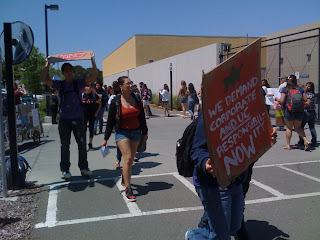
I'm currently part of a group of researchers here at UCD that's doing a study on CSAs, Community Supported Agriculture programs on farms here in the Central Valley of California. CSAs, for those of you unfamiliar with the concept, are subscription contracts between community members and farmers, basically consumers pay up front for goods (which can be produce, meat, eggs, dairy, processed farm goods) and the farmer, or CSA manager grows or procures that product and gives the consumer a weekly or bi-monthy portion of that product for a season. Now, as I'm learning doing this research, there are a lot of ways to run a CSA. Large and small, communities and farms are redefining the meaning of the traditional CSA.
As I've been driving to and fro in the Valley, hearing the trials and tribulations of farmer after farmer, I've been thinking-- what would true community support for agriculture look like. I'm not talking about the CSA- which, don't get me wrong, is revolutionary, definitely an exceptional way to turn traditional capitalist relationships of consumers and producers on it's head -- I'm talking beyond the CSA. What can whole communities- not just well meaning individuals in a community-- but entire municipalities, states, and dare I say- the feds, do to support agriculture.
Much of this thinking has been prompted by my Masters program in Community Development, witnessing the tangible ways that communities choose to support education, housing, healthcare-- why not agriculture? Again and again I speak to farmers who are struggling, who, despite their creativity, wit, and sheer physical force feel like they are fighting a loosing battle. In the midst of the most expansive time in the public history of alternative food systems, they feel unsupported.
I don't pretend to have the answer yet. My thinking lately has been towards securing land tenure for farms, renewing the Williamson Act (at least in California), increasing market access for beginning farmers, and increasing the willingness of the public to pay the true cost of food-- but I know there must be other more pragmatic ways that communities can truly support agriculture.



